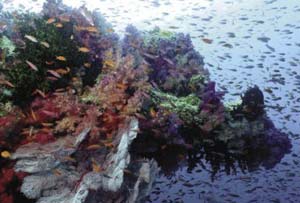Tooth decay and coral reef death
Corals can be damaged by a process similar to human decay.
 (Artwork: islandsbusiness) Under normal conditions, corals live in symbiosis with unicellular algae, but when environmental pollution occurs, a large algae can thrive throughout the reef and cause serious problems.
(Artwork: islandsbusiness) Under normal conditions, corals live in symbiosis with unicellular algae, but when environmental pollution occurs, a large algae can thrive throughout the reef and cause serious problems.
Recent research by Tennifer Smith, Santa Barbara of the University of California indicates that some large algae diffuse sugar into corals, increasing the activity of pathogenic bacteria and indirectly causing coral death.
Tennifer and colleagues carried out experiments on coral reefs and algae in the North Pacific Line Islands. Corals and experimental water samples are placed in interconnected jars and separated by 0.02 Micrometer membrane which allows trap substances to change without the passing of bacteria and viruses. At this time, water samples that are lethal to corals are determined by the diffusion of sugars from reservoirs of water samples to coral reservoirs, stimulating the development of coral microbes available in its structure. Parallel experiments were performed with the addition of ampicillin-a comprehensive bacterial inhibitor and as a result all corals survived.
The results of the study have just been published at the 'International Reef Researchers' Association, Bremen-Germany.
Peter Mumby of the University of Exeter-UK predicts: 'Another potential risk is that there is a high possibility that coral dominance can be replaced by the persistent dominance of large algae, due to the downhill of coral reefs'.
Nguyen Huu Hoang
- Milk tooth decay in young children
- 50% of corals worldwide have disappeared
- Japan creates permanent anti-decay patch
- The world's largest coral reef is dying
- The discovery of a giant coral reef measuring 56,000 km2 off Brazil
- The secret to fluoride's decay
- New measures to help prevent the risk of tooth decay
- Tooth decay in children
- Vaccines for tooth decay are coming soon
- Australia implements a system to protect coral reefs
- Map the global coral
- Detecting mummies dying from tooth decay
 Surprised: Fish that live in the dark ocean still see colors
Surprised: Fish that live in the dark ocean still see colors Japan suddenly caught the creature that caused the earthquake in the legend
Japan suddenly caught the creature that caused the earthquake in the legend A series of gray whale carcasses washed ashore on California's coast
A series of gray whale carcasses washed ashore on California's coast Compare the size of shark species in the world
Compare the size of shark species in the world Surprised how corals protect themselves from rising sea temperatures
Surprised how corals protect themselves from rising sea temperatures  Why do some reefs change colors when they are 'stressed'?
Why do some reefs change colors when they are 'stressed'?  New hope for corals to die from global warming
New hope for corals to die from global warming  Is coral a plant or animal?
Is coral a plant or animal?  What will the ocean look like in 100 years?
What will the ocean look like in 100 years?  Scientists have found a giant coral reef hidden in the ocean floor
Scientists have found a giant coral reef hidden in the ocean floor 